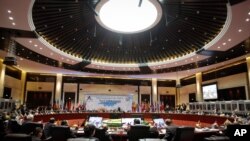BANGKOK —
Asian and European leaders say China’s economy is pivotal to the global economic recovery and are pledging to boost international free trade. Meeting in the Laotian capital Vientiane, they warned of “substantial” uncertainties in the global economy, but vowed to promote free trade and renounce protectionism.
The Asia-Europe Meeting (ASEM) expressed hope Europe would gradually recover from its deep recession and move towards sustainable and balanced growth. Key European leaders included those from France, Italy and Russia, as well as the European Commission, with Asia’s representatives led by key economic drivers, China, Japan and Indonesia.
Analysts say the meeting, which closed Tuesday and involved more than 50 countries, was marked by China’s heightened role as a source of trade and investment for the beleaguered European economies.
A political scientist at Chulalongkorn University in Thailand, Thitinan Pongsudhirak, says China is viewed as playing a key role in European recovery.
“We need to rely on China to drive the world economy forward and thereby pull the Eurozone economies along. That is why there has been some accommodation, a lot of interest in China, and in the end money counts. The Europeans are in crisis, they need the Chinese economy, they need the Chinese macro-economic numbers and currency reserves to pull them out of this crisis," said Thitinan Pongsudhirak.
Earlier, Chinese Premier Wen Jiabao said he is confident in China’s outlook, but also called for free, open and fair international trade, and a sound system of global economic governance. Premier Wen was upbeat over a new comprehensive partnership between Asia and Europe.
Malaysia Prime Minister Najib Razak says the European countries hope to see China “rebalance” its economy.
“If you talk to this part of the world they see China as a very strong, benign economic force. But in terms of the debate, I think there is a general feeling amongst European countries, there is a need for China to rebalance its economy, less emphasis on export, but provide more domestic demand. I think there is a gentle hint about the need to rebalance its economy," said Razak.
A major change in China’s leadership takes place this week during the Chinese Communist Party congress.
Australia Prime Minister Julia Gillard, whose government recently called for closer ties with Asia, said China has shown a willingness to play a greater role on the global economic stage, including through the International Monetary Fund (IMF).
"I think there is a role for China to play in the global efforts to enhance growth and jobs, and China has been involved in those discussions at the G20 table. It has been involved in, and active on, issues like IMF resourcing. So what further it chooses to do, obviously I will leave to the leaders of China to speak about," said Gillard.
The more than 50 nations, which account for about half of global economic output, have largely focused on economic and financial issues as well as global security. It was the ninth meeting of the group that first convened in Thailand in 1996.
The Asia-Europe Meeting (ASEM) expressed hope Europe would gradually recover from its deep recession and move towards sustainable and balanced growth. Key European leaders included those from France, Italy and Russia, as well as the European Commission, with Asia’s representatives led by key economic drivers, China, Japan and Indonesia.
Analysts say the meeting, which closed Tuesday and involved more than 50 countries, was marked by China’s heightened role as a source of trade and investment for the beleaguered European economies.
A political scientist at Chulalongkorn University in Thailand, Thitinan Pongsudhirak, says China is viewed as playing a key role in European recovery.
“We need to rely on China to drive the world economy forward and thereby pull the Eurozone economies along. That is why there has been some accommodation, a lot of interest in China, and in the end money counts. The Europeans are in crisis, they need the Chinese economy, they need the Chinese macro-economic numbers and currency reserves to pull them out of this crisis," said Thitinan Pongsudhirak.
Earlier, Chinese Premier Wen Jiabao said he is confident in China’s outlook, but also called for free, open and fair international trade, and a sound system of global economic governance. Premier Wen was upbeat over a new comprehensive partnership between Asia and Europe.
Malaysia Prime Minister Najib Razak says the European countries hope to see China “rebalance” its economy.
“If you talk to this part of the world they see China as a very strong, benign economic force. But in terms of the debate, I think there is a general feeling amongst European countries, there is a need for China to rebalance its economy, less emphasis on export, but provide more domestic demand. I think there is a gentle hint about the need to rebalance its economy," said Razak.
A major change in China’s leadership takes place this week during the Chinese Communist Party congress.
Australia Prime Minister Julia Gillard, whose government recently called for closer ties with Asia, said China has shown a willingness to play a greater role on the global economic stage, including through the International Monetary Fund (IMF).
"I think there is a role for China to play in the global efforts to enhance growth and jobs, and China has been involved in those discussions at the G20 table. It has been involved in, and active on, issues like IMF resourcing. So what further it chooses to do, obviously I will leave to the leaders of China to speak about," said Gillard.
The more than 50 nations, which account for about half of global economic output, have largely focused on economic and financial issues as well as global security. It was the ninth meeting of the group that first convened in Thailand in 1996.
